

The hidden fingerprint inside your photos - BBC Future. Making honey without bees and milk without cows. Microsoft Mesh: Will it change how we collaborate? Audio cassette tape inventor Lou Ottens dies aged 94. Smart glasses help to find your makeup palette. Oppo's expanding phone can grow and shrink on demand. Four causes for ‘Zoom fatigue’ and their solutions. Even as more people are logging onto popular video chat platforms to connect with colleagues, family and friends during the COVID-19 pandemic, Stanford researchers have a warning for you: Those video calls are likely tiring you out.
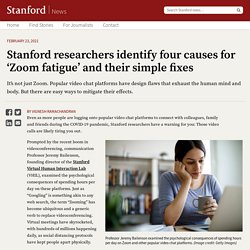
Professor Jeremy Bailenson examined the psychological consequences of spending hours per day on Zoom and other popular video chat platforms. (Image credit: Getty Images) Prompted by the recent boom in videoconferencing, communication Professor Jeremy Bailenson, founding director of the Stanford Virtual Human Interaction Lab (VHIL), examined the psychological consequences of spending hours per day on these platforms. Just as “Googling” is something akin to any web search, the term “Zooming” has become ubiquitous and a generic verb to replace videoconferencing.
Virtual meetings have skyrocketed, with hundreds of millions happening daily, as social distancing protocols have kept people apart physically. 'Farms are going to need different kinds of robots' Military trials training for missions in virtual reality. Smart materials: From tiny robots to colour-swapping clothes.
ZoomOut: Waving goodbye to awkward video call endings. Health check: Measuring vital signs with a smartphone. SpaceX: World record number of satellites launched. Satellites beat balloons in race for flying internet. Adobe Flash Player is finally laid to rest. Do You Love Me? France to start research into 'enhanced soldiers' Singapore approves lab-grown 'chicken' meat. AWS: Amazon web outage breaks vacuums and doorbells. Tesco limits online customers amid Christmas rush. Social media: How might it be regulated?
NHS data: Can web creator Sir Tim Berners-Lee fix it? 5G: Using drones to beam signals from the stratosphere. Digital voting trialled in US presidential election. Why Messaging Queues Suck. Based on responses to this article, Bob Reselman wrote a counterpoint, "Why Messages Queues Might Not Suck.
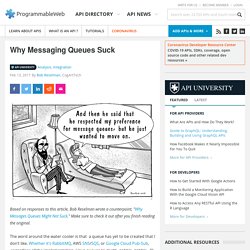
" Make sure to check it out after you finish reading the original. The word around the water cooler is that a queue has yet to be created that I don’t like. Whether it’s RabbitMQ, AWS SNS/SQS, or Google Cloud Pub-Sub, regardless of the implementation, I love queues to death, gobble, gobble...I’ll eat ‘em up. Ex-Google boss Eric Schmidt: US 'dropped the ball' on innovation. Media playback is unsupported on your device In the battle for tech supremacy between the US and China, America has "dropped the ball" in funding for basic research, according to former Google chief executive Eric Schmidt.
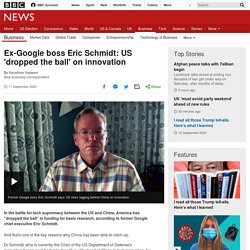
And that's one of the key reasons why China has been able to catch up. Dr Schmidt, who is currently the Chair of the US Department of Defense's innovation board, said he thinks the US is still ahead of China in tech innovation, for now. But that the gap is narrowing fast. The surprising secret hidden in a pregnancy test. A teardown of a digital pregnancy test has created a buzz after revealing it contained a standard paper test, similar to those used by GPs.
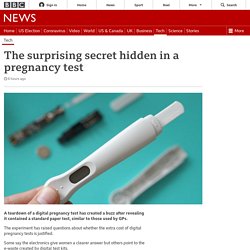
The experiment has raised questions about whether the extra cost of digital pregnancy tests is justified. Some say the electronics give women a clearer answer but others point to the e-waste created by digital test kits. The experiment also found the digital test contained a microprocessor more powerful than early home computers. But the electronics themselves did not play a role in the hormone detection.
Virtual time machine: ‘I can watch my life from 2019’ Is Elon Musk over-hyping his brain-hacking Neuralink tech? Image copyrightNeuralink He is the most charismatic figure in technology with some amazing achievements to his name, from making electric cars desirable to developing rockets that can return to earth and be reused.
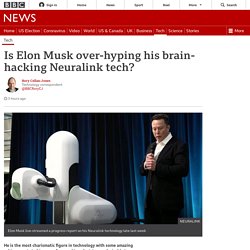
But dare to suggest that anything Elon Musk does is not groundbreaking or visionary and you can expect a backlash from the great man and his army of passionate fans. That is what happened when a British academic criticised Musk's demo on Friday of his Neuralink project - and the retaliation he faced was largely my fault. Neuralink is a hugely ambitious plan to link the human brain to a computer. Neuralink: Elon Musk unveils pig with chip in its brain.
Stress, burnout and redundancy: Tough times in IT. Image copyright Jack Stevens You would think that an IT professional could switch to remote working smoothly.
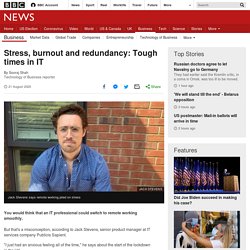
But that's a misconception, according to Jack Stevens, senior product manager at IT services company Publicis Sapient. "I just had an anxious feeling all of the time," he says about the start of the lockdown in the UK. His role involved a lot of teamwork and ad hoc conversations and when lockdown began, the only conversations he would have with his colleagues were using video conferencing tools. Phones could detect drinking over legal driving limit. Image copyright Press Association Smartphones can detect when you've had too much to drink by monitoring your walk, a study has found.
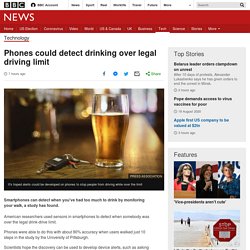
American researchers used sensors in smartphones to detect when somebody was over the legal drink-drive limit. Phones were able to do this with about 90% accuracy when users walked just 10 steps in the study by the University of Pittsburgh. Scientists hope the discovery can be used to develop device alerts, such as asking people not to drive while drunk. "We have powerful sensors we carry around with us wherever we go," lead researcher Brian Suffoletto said. What makes China's social media apps so unique? Beyond Zoom: The future of virtual meetings. News BBC News Navigation Sections Previous Next.
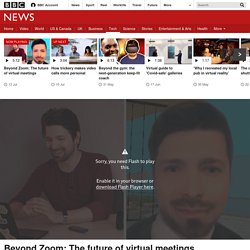
The robots that can cook and serve your food. News BBC News Navigation Sections Previous Next Media player Media playback is unsupported on your device The robots that can cook and serve your food.
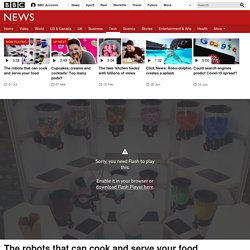
Top Applications Of Quantum Computing Everyone Should Know About. With the exponential growth in computing power, quantum computing is getting ready for its close up.
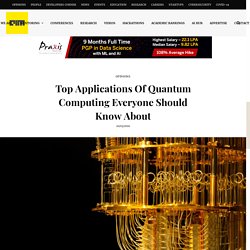
Quantum computers are ideally suited to solving complex problems, which are hard for classical computers but are easy to factor on a quantum computer. Such an advancement creates a world of opportunities, across almost every aspect of modern life. In fact, Google has recently made headlines proclaiming the achievement of quantum supremacy, where its computers can perform a task that a conventional computer can’t. IBM is also making noise about their supercomputers, which are blazingly fast. However, we often wonder what these things actually do and what are its real-world applications? In this article, we are going to talk about some of the top quantum computing applications in the real world. Adobe Voco 'Photoshop-for-voice' causes concern. Image copyright Adobe A new application that promises to be the "Photoshop of speech" is raising ethical and security concerns. Adobe unveiled Project Voco last week.
The software makes it possible to take an audio recording and rapidly alter it to include words and phrases the original speaker never uttered, in what sounds like their voice. One expert warned that the tech could further undermine trust in journalism. This AI Can Clone Any Voice, Including Yours. Fortnite Movie Nite: Christopher Nolan's hit films screen in-game. Image copyright EPic Games Later this Friday, Fortnite players will stow away their guns and kick back for a movie screening. Three of Christopher Nolan's biggest films - The Dark Knight, Inception, and The Prestige - will be shown in the game's Party Royale mode.
Coronavirus: What went wrong with the UK's contact tracing app? After months of work, the UK has ditched the way its coronavirus-tracing app works, prompting a blame game between the government and two of the world's biggest tech firms. So what went wrong? At the end of March, I got a text from a senior figure in the UK's technology industry. This person said they were helping the NHS "on a very substantial project that will launch in days and potentially save hundreds of thousands of British lives. " That was the first I knew of the plan to build a contact tracing app, a project that soon appeared to be at the very centre of the government's strategy to beat coronavirus and help us all emerge from lockdown. The tech luminary had somehow assumed that I could be an adviser to the project - I made it clear that could not be my role but I was very interested in following its progress.
Now, nearly three months on, after missing deadline after deadline, there has been a radical change in direction. March April. 'How my photo ended up breaking Android phones' Image copyright GAURAV AGRAWAL Gaurav Agrawal, a scientist and amateur photographer living in San Diego, couldn't believe it when he suddenly started seeing a photograph he took last summer popping up on the news. He took it at St Mary Lake in Glacier National Park, Montana, one "magical evening" in August 2019.
He shared the snap on photo platform Flickr and thought no more about it. However, a glitch meant that when the image was set as wallpaper, it caused some Android phones to fail. Developer warns VR headset damaged eyesight. Image copyright Getty Images A software developer has tweeted about how wearing a VR headset for hours a day has damaged his eyesight. A visit to the opticians left him "worried about my future VR use" after a doctor blamed the technology for a problem with his vision. Glasses should correct the issue but would normally only "be prescribed to 40-year-olds", he tweeted.
The Association of Optometrists said it had not seen evidence that VR headsets could cause permanent eye damage. Coronavirus face mask lights up with moving mouth shapes. News BBC News Navigation. Android: Why this photo is bricking some phones. Image copyright Universe Ice. Robot dog tries to herd sheep. RTX Voice: Noise-destroying tech put to the test. Coronavirus: Hands on with NHS Covid-19 contact-tracing app. For an app with so much riding on it, NHS Covid-19 is at first sight very simple and extraordinarily unexciting. A breakthrough approaches for solar power. Image copyright Getty Images One of the few parts of the UK economy to have a good April was solar power. The Met Office says it has probably been the sunniest April on record and the solar power industry reported its highest ever production of electricity (9.68GW) in the UK at 12:30 on Monday 20 April.
With 16 solar panels on his roof Brian McCallion, from Northern Ireland, has been one of those benefitting from the good weather. Would you eat a 'steak' printed by robots? Skin-detection software could improve smartphone security. Larry Tesler: Computer scientist behind cut, copy and paste dies aged 74. Image copyright Getty Images Larry Tesler, an icon of early computing, has died at the age of 74. Mr Tesler started working in Silicon Valley in the early 1960s, at a time when computers were inaccessible to the vast majority of people. It was thanks to his innovations - which included the "cut", "copy" and "paste" commands - that the personal computer became simple to learn and use.
Xerox, where Mr Tesler spent part of his career, paid tribute to him. Smart contact lens: 'It feels seriously sci-fi' US man breaks record for completing marathon in an exoskeleton. CES 2020: Samsung's invisible keyboard for smartphones. CES 2020: Juno 'reverse microwave oven' cools drinks in seconds. CES 2020: Pork made from plants launched by Impossible Foods. Media playback is unsupported on your device A plant-based pork substitute has been launched in Las Vegas by one of the leading "alternative meat" producers. Impossible Foods, the firm behind the Impossible Burger, says it hopes to appeal to a global audience with its latest vegetarian-friendly meal, which it unveiled at the CES tech show. Samsung's new Family Hub refrigerator uses computer vision to keep tabs on groceries. If you’re in the market for a new fridge, no need to fret — Samsung’s got you covered.
This morning, ahead of the 2020 Consumer Electronics Show (CES), the tech giant debuted the latest addition to its Family Hub refrigeration lineup, which features improved AI as well as meal-planning features and better synergy with Samsung smartphones, TVs, and mobile devices. The new Family Hub refrigerator boasts AI-powered ViewInside cameras that automatically scan products, identify them, and send updates when new ones are added or old ones are depleted.
Russia 'successfully tests' its unplugged internet. Image copyright Reuters Russia has successfully tested a country-wide alternative to the global internet, its government has announced. Details of what the test involved were vague but, according to the Ministry of Communications, ordinary users did not notice any changes. The results will now be presented to President Putin. Experts remain concerned about the trend for some countries to dismantle the internet. "Sadly, the Russian direction of travel is just another step in the increasing breaking-up of the internet," said Prof Alan Woodward, a computer scientist at the University of Surrey. What is Serverless Computing? Apple, Google and Amazon decide to 'play nice' over smart home tech. The Death of Microservice Madness in 2018. General Election 2019: How computers wrote BBC election result stories.
Russian cows get VR headsets 'to reduce anxiety' Thousands flock to Wikipedia founder's 'Facebook rival' Want to run faster? Improve your algorithm. Could the world cope if GPS stopped working? Blade Runner: How well did the film predict 2019's tech? Internet 'father' Vint Cerf on future challenges ahead for the web. How a social network could save democracy from deadlock. Goodbye SMS texting, hello RCS. Google claims 'quantum supremacy' for computer. And 'Lo!' - How the internet was born. Pagers, faxes and cheques: Things that might seem obsolete, but aren't. The fashion that lets you feel music. Boston Dynamics robot dog Spot goes on sale. This app cancels your free trials before you have to pay anything. App that cancels subscriptions launches in UK. Hong Kong protesters using Bluetooth Bridgefy app.
Facial recognition technology aims to cut passport queue times. The Cold War spy technology which we all use. Massive Attack album stored in a painting using DNA - BBC Reel. Tweeting from your fridge: The smart tech getting smarter. Electronic tongue puts fiery foods to the test. In fighting deep fakes, mice may be great listeners. King's Cross developer defends use of facial recognition. Galaxy Note 10: Hands on with Samsung's two new smartphones. If one drone isn't enough, try a drone swarm. Huawei announces its new Harmony operating system. Galaxy Note 10: Samsung hopes to strike the right Note. MIT Media Lab: Making ideas into reality. Nature's language is being hijacked by technology.
MPs call for halt to police's use of live facial recognition. Does 5G pose health risks? How apps power Hong Kong's 'leaderless' protests. Goggles 'give back' sight to Maisy so she can read again. IMF warns of giant tech firms' dominance. 5G put to the test on the street. If a house was designed by machine, how would it look? Warning over using augmented reality in precision tasks. What is Metadata (with examples) - Dataedo Data terminology.